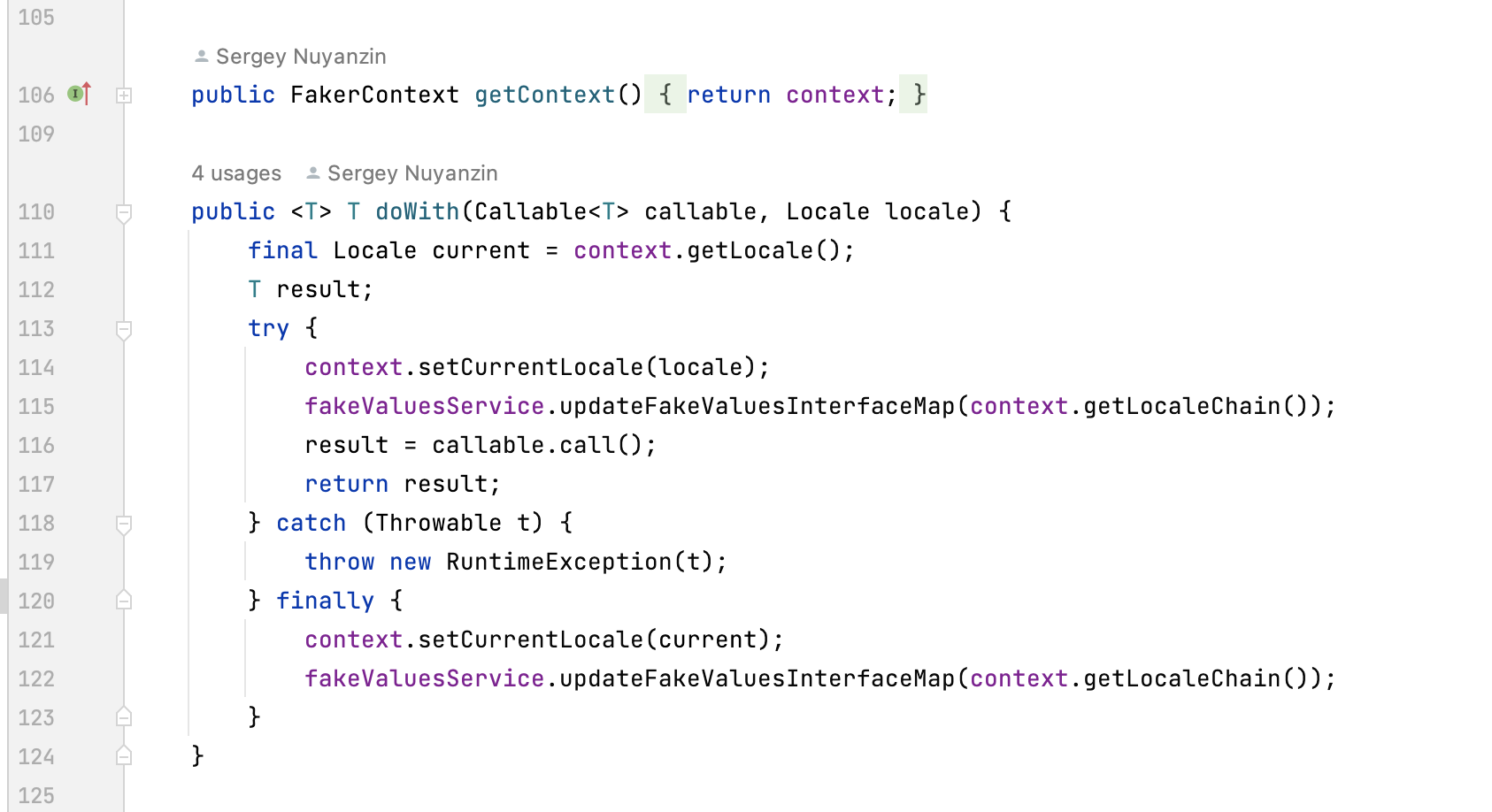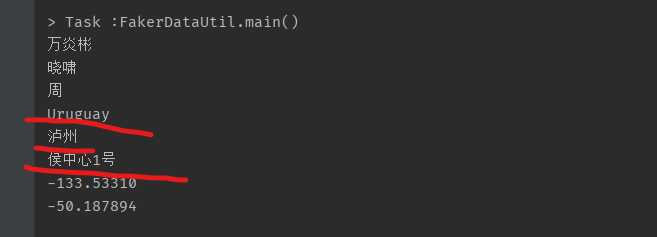This library is a modern fork of java-faker with up to date libraries and several newly added Fake Generators.
Datafaker 2.x has Java 17 as the minimum requirement.
If Java 17 is not an option for you, you can choose to use Datafaker 1.x. Datafaker 1.x is built on Java 8, but this version is no longer maintained. We recommend all users to upgrade to Datafaker 2.x.
This library generates fake data, similar to other fake data generators, such as:
- Ruby's faker gem
- Perl's Data::Faker library
- Python faker package
- PHP faker library
- Javascript Faker.js library
It's useful when you're developing a new project and need some pretty data for showcase.
In the pom.xml, add the following fragment to the dependencies section:
<dependency>
<groupId>net.datafaker</groupId>
<artifactId>datafaker</artifactId>
<version>2.1.0</version>
</dependency>For Gradle users, add the following to your build.gradle file.
dependencies {
implementation 'net.datafaker:datafaker:2.1.0'
}
You can also use the snapshot version (2.1.1-SNAPSHOT), which automatically gets published
after every push to the main branch of this repository. Binary repository URL for snapshots download is
https://s01.oss.sonatype.org/content/repositories/snapshots/.
In your Java code:
Faker faker = new Faker();
String name = faker.name().fullName(); // Miss Samanta Schmidt
String firstName = faker.name().firstName(); // Emory
String lastName = faker.name().lastName(); // Barton
String streetAddress = faker.address().streetAddress(); // 60018 Sawayn Brooks Suite 449Or in your Kotlin code:
val faker = Faker()
val name = faker.name().fullName() // Miss Samanta Schmidt
val firstName = faker.name().firstName() // Emory
val lastName = faker.name().lastName() // Barton
val streetAddress = faker.address().streetAddress() // 60018 Sawayn Brooks Suite 449JShell
# from project root folder
jshell --class-path $(ls -d target/*.jar | tr '\n' ':')
| Welcome to JShell -- Version 17.0.4
| For an introduction type: /help intro
jshell> import net.datafaker.Faker;
jshell> var faker = new Faker();
faker ==> net.datafaker.Faker@c4437c4
jshell> faker.address().city();
$3 ==> "Brittneymouth"
jshell> faker.name().fullName();
$5 ==> "Vernie Schmidt"
Faker faker = new Faker();
faker.expression("#{letterify 'test????test'}"); // testqwastest
faker.expression("#{numerify '#test#'}"); // 3test5
faker.expression("#{templatify 'test','t','q','@'}"); // @esq
faker.expression("#{examplify 'test'}"); // ghjk
faker.expression("#{regexify '[a-z]{4,10}'}"); // wbevoa
faker.expression("#{options.option '23','2','5','$','%','*'}"); // *
faker.expression("#{date.birthday 'yy DDD hh:mm:ss'}"); // 61 327 08:11:45
faker.expression("#{csv '1','name_column','#{Name.first_name}','last_name_column','#{Name.last_name}'}");
// "name_column","last_name_column"
// "Sabrina","Kihn"
faker.expression("#{json 'person','#{json ''first_name'',''#{Name.first_name}'',''last_name'',''#{Name.last_name}''}','address','#{json ''country'',''#{Address.country}'',''city'',''#{Address.city}''}'}");
// {"person": {"first_name": "Barbie", "last_name": "Durgan"}, "address": {"country": "Albania", "city": "East Catarinahaven"}}also more examples at https://www.datafaker.net/documentation/expressions/
Faker faker = new Faker();
List<String> names = faker.collection(
() -> faker.name().firstName(),
() -> faker.name().lastName())
.len(3, 5)
.generate();
System.out.println(names);
// [Skiles, O'Connell, Lorenzo, West]more examples about that at https://www.datafaker.net/documentation/sequences/
Faker faker = new Faker();
// generate an infinite stream
Stream<String> names = faker.stream(
() -> faker.name().firstName(),
() -> faker.name().lastName())
.generate();There are 2 ways of data generation in specific formats
- Generate it from scratch
- There is already a sequence of objects and we could extract from them some values and return it in specific format
For both cases we need a Schema which could describe fields and a way of data generation.
In case of generation from scratch Suppliers are enough, in case of transformation Functions are required
// transformer could be the same for both
CsvTransformer<Name> transformer =
CsvTransformer.<Name>builder().header(true).separator(",").build();
// Schema for from scratch
Schema<Name, String> fromScratch =
Schema.of(field("firstName", () -> faker.name().firstName()),
field("lastname", () -> faker.name().lastName()));
System.out.println(transformer.generate(fromScratch, 2));
// POSSIBLE OUTPUT
// "first_name" ; "last_name"
// "Kimberely" ; "Considine"
// "Mariela" ; "Krajcik"
// ----------------------
// Schema for transformations
Schema<Name, String> schemaForTransformations =
Schema.of(field("firstName", Name::firstName),
field("lastname", Name::lastName));
// Here we pass a collection of Name objects and extract first and lastnames from each element
System.out.println(
transformer.generate(
faker.collection(faker::name).maxLen(2).generate(), schemaForTransformations));
// POSSIBLE OUTPUT
// "first_name" ; "last_name"
// "Kimberely" ; "Considine"
// "Mariela" ; "Krajcik"# from project root folder
jshell --class-path $(ls -d target/*.jar | tr '\n' ':')
| Welcome to JShell -- Version 17.0.4
| For an introduction type: /help intro
jshell> import net.datafaker.Faker;
jshell> import net.datafaker.providers.base.Name;
jshell> import net.datafaker.transformations.Schema;
jshell> import net.datafaker.transformations.CsvTransformer;
jshell> import static net.datafaker.transformations.Field.field;
jshell> var faker = new Faker();
faker ==> net.datafaker.Faker@c4437c4
jshell> Schema fromScratch =
...> Schema.of(field("firstName", () -> faker.name().firstName()),
...> field("lastname", () -> faker.name().lastName()));
fromScratch ==> net.datafaker.transformations.Schema@306a30c7
jshell> CsvTransformer<Name> transformer =
...> CsvTransformer.<Name>builder().header(false).separator(",").build();
transformer ==> net.datafaker.transformations.CsvTransformer@506c589e
jshell> System.out.println(transformer.generate(fromScratch, 2));
"firstName","lastname"
"Darcel","Schuppe"
"Noelle","Smitham"
Schema<Object, ?> schema = Schema.of(
field("firstName", () -> faker.name().firstName()),
field("lastName", () -> faker.name().lastName())
);
JsonTransformer<Object> transformer = JsonTransformer.builder().build();
String json = transformer.generate(schema, 2);
// [{"firstName": "Oleta", "lastName": "Toy"},
// {"firstName": "Gerard", "lastName": "Windler"}]More complex examples and other formats like YAML, XML could be found at https://www.datafaker.net/documentation/formats/
Faker faker = new Faker();
// The values returned in the following lines will never be the same.
String firstUniqueInstrument = faker.unique().fetchFromYaml("music.instruments"); // "Flute"
String secondUniqueInstrument = faker.unique().fetchFromYaml("music.instruments"); // "Clarinet"More examples can be found in https://www.datafaker.net/documentation/unique-values
Add your own custom provider in your app following steps from https://www.datafaker.net/documentation/custom-providers/
See CONTRIBUTING.md
If this is your first time contributing then you may find it helpful to read FIRST_TIME_CONTRIBUTOR.md
The list below is not complete and shows only a part of available providers. To view the full list of providers, please follow the link: Full list of providers.
- Address
- Ancient
- Animal
- App
- Appliance
- Aqua Teen Hunger Force
- Artist
- Australia
- Avatar
- Aviation
- AWS
- Azure
- Babylon 5
- Back To The Future
- Barcode
- Baseball
- Basketball
- Battlefield 1
- Beer
- Big Bang Theory
- Blood Type
- Bojack Horseman
- Book
- Bool
- Bossa Nova
- Brand
- Breaking Bad
- Brooklyn Nine-Nine
- Buffy
- Business
- CNPJ (Brazilian National Registry of Legal Entities)
- CPF (Brazilian individual taxpayer registry identification)
- Camera
- Cat
- Chuck Norris
- Clash of Clans
- Code
- Coin
- Color
- Commerce
- Community
- Company
- Compass
- Computer
- Control
- Country
- Credit Card Type
- Cricket
- Crypto
- Currency
- Date and Time
- DC Comics
- Demographic
- Departed
- Dessert
- Device
- Disease
- Doctor Who
- Dog
- Domain
- Doraemon
- Dragon Ball
- Driving License
- Dumb and Dumber
- Dune
- Durations
- Educator
- Elden Ring
- Elder Scrolls
- Electrical Components
- Emoji
- England Football
- Esports
- Fallout
- Family Guy
- Famous Last Words
- File
- Final Space
- Finance
- Food
- Formula 1 (:racing_car:)
- Friends
- Fullmetal Alchemist: Brotherhood
- Funny Name
- Futurama
- Game Of Thrones
- Garment Size
- Gender
- Ghostbusters
- Grateful Dead
- Greek Philosopher
- Hacker
- Harry Potter
- Hashing
- Hearthstone
- Heroes of the Storm
- Hey Arnold
- Hipster
- Hitchhiker's Guide To The Galaxy
- Hobbit
- Hobby
- Horse
- House
- How I Met Your Mother
- IdNumber
- Industry Segments
- Internet
- Job
- Joke
- K-pop (Korean popular music)
- Kaamelott
- Language Code
- League Of Legends
- Lebowski
- Locality
- Lord Of The Rings
- Lorem
- Marketing
- Marvel Snap
- Mass Effect
- Matz
- MBTI
- Measurement
- Medical
- Military
- Minecraft
- Money
- Money Heist
- Mood
- Mountaineering
- Mountains
- Movie
- Music
- Name
- Naruto
- Nation
- Nato Phonetic Alphabet
- Nigeria
- Number
- One Piece
- Options
- Oscar Movie
- Overwatch
- Passport
- Password
- Phone Number
- Photography
- Planet
- Pokemon
- Princess Bride
- Programming Language
- Red Dead Redemption 2
- Relationship Terms
- Resident Evil
- Restaurant
- Rick and Morty
- Robin
- Rock Band
- RuPaul's Drag Race
- Science
- Seinfeld
- Shakespeare
- Silicon Valley
- Simpsons
- Sip
- Size
- Slack Emoji
- Soul Knight
- Space
- StarCraft
- StarTrek
- Stock
- Studio Ghibli
- Subscription
- Super Mario
- Superhero
- Tea
- Team
- The IT Crowd
- Time
- Touhou
- Tron
- Twin Peaks
- University
- Vehicle
- Verb
- Volleyball
- Weather
- Witcher
- Yoda
- Zelda
Faker faker = new Faker(new Locale("YOUR_LOCALE"));For example:
new Faker(new Locale("en", "US")).address().zipCodeByState("CA"));- ar
- bg
- ca
- ca-CAT
- cs
- da-DK
- de
- de-AT
- de-CH
- el-GR
- en
- en-AU
- en-au-ocker
- en-BORK
- en-CA
- en-GB
- en-IND
- en-MS
- en-NEP
- en-NG
- en-NZ
- en-PAK
- en-SG
- en-UG
- en-US
- en-ZA
- en-PH
- es
- es-MX
- fa
- fi-FI
- fr
- he
- hu
- in-ID
- it
- ja
- ka
- ko
- nb-NO
- nl
- pl
- pt
- pt-BR
- ru
- sk
- sv
- sv-SE
- tr
- uk
- vi
- zh-CN
- zh-TW
Copyright (c) 2024 Datafaker.net See the LICENSE file for license rights and limitations.






